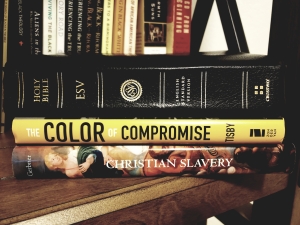 And he had to pass through Samaria.
And he had to pass through Samaria.
– John 4:4
If we don’t understand first century Jewish customs, we might miss the significance of this verse and of Jesus’ actions described in John 4:1-45. John tells us that he had to pass through Samaria. This was not just a geographical “had to”, but a missional “had to”. The usual route from Judea to Galilee was through Samaria, but often Jews, seeking to preserve their purity and avoid defilement, bypassed this half-Jew half Gentile region. In addition to this religious segregation, there was historical animosity between Jews and Samaritans that fueled intense social segregation Next, John recorded Jesus’ interaction with a Samaritan woman at a well in Sychar. He was thirsty and she was there to draw water at the sixth hour or around noon. Normally, women would draw water in the cooler parts of the day – morning or sunset. This woman was there during the hottest part of the day. Why? Later on in this chapter, we find out that she is an immoral woman having had five husbands and currently living with a man who wasn’t her husband (John 4:16-18). Such immorality made her the target of hostility among other women, so she draws water at a time of day when no one was around. She didn’t want to be constantly shamed by her peers for her immoral lifestyle.
Considering the social customs of the day, Jesus’ actions were questionable, if not scandalous. First, he intentionally went to an area that law abiding Jews avoided and he asked a Samaritan for something to drink. Second, he was speaking to a woman in public, which was not what rabbis of that day did. Third, he was speaking to an immoral woman. Normally, publicly associating with an immoral woman would jeopardize a man’s name and reputation. In his discourse with this woman, Jesus intentionally bypassed all of the socially accepted norms to see this woman become a citizen of heaven and no longer an outcast of Samaria. He bypassed ethnic impartiality, sexism, religion and self-preservation to introduce the Samaritan woman to the Messiah – to himself (John 4:25-26). Consider for a moment how this woman must have felt initially. We can see from the text that she knew this interaction wasn’t normal (John 4:9). Even Jesus’ disciples knew this wasn’t normal (John 4:27). After her interaction with Jesus, she goes back to her town to testify of the Messiah and many believed in Jesus on the account of her testimony (John 4:29,39).
We should not miss the placement of this passage in John’s gospel account. In chapter 3, Jesus tells Nicodemus, a leading Pharisee, that a person must be born again to enter the kingdom, which happens by the regenerating work of the Spirit (John 3:1-8). That work of the Spirit is inextricably tied to belief in the Son, whom God sent into the world for salvation as an act of love for everyone who believes (John 3:16-21).
I wonder how Nicodemus heard “everyone” considering how some Jews despised Gentiles (non-Jews) and didn’t believe Gentiles had a share in God’s kingdom. It is no accident that John places this account of the Samaritan woman at the well on the heels of Jesus’ salvation explanation to one of Israel’s elite religious teachers. Though salvation is from the Jews, clearly it is not solely for the Jews. Redemption is for everyone who believes irrespective of ethnicity, language, skin color, culture or gender. It has always been God’s plan to gather a multi-ethnic, multilingual and multicultural people into His kingdom. Consider a few verses from Scripture-
-
Genesis 12:1-3 – Abraham would become a great nation and in him all the families of the earth shall be blessed.
-
Joshua 2:1-13 – Rahab, a Gentile prostitute, trusts in the LORD.
-
1 Kings 17:8-24 – The LORD sent Elijah to Zarephath in Sidon (a Gentile city) to a widow and her son to bear witness of himself as the God who gives daily bread and the God who raises the dead (Gentile resurrection).
-
Psalm 22:27-28 – David prophesies that the nations would turn to the LORD and worship him.
-
Psalm 67 – A call for the nations to worship and praise God.
-
Psalm 86:9 – David foresees a day when the nations will worship and glorify God.
-
Isaiah 2:1-4 – Isaiah had a vision that the nations would go to the house of the LORD (new Jerusalem in the NH/NE).
-
Isaiah 42:1-9 & Isaiah 49:1-7 – The LORD’s servant will be given as a covenant and light to the nations.
-
Isaiah 66:18-23 – After the final judgment, the new creation will be inhabited by people from the nations.
-
Micah 4:1-5 – Zion, the mountain of the LORD (place of worship – Jerusalem) will be re-established and people from many nations will flock to worship God and submit to the Law of God.
-
Matthew 28:18-20 – Jesus commissions His disciples to go make disciples of all nations.
-
Luke 24:44-47 – Jesus’ post-resurrection teaching his disciples that He is the fulfillment of Scripture and the gospel should be proclaimed to all nations.
-
Acts 1:6-8 – Just before His ascension, Jesus reiterated to his disciples the necessity of the gospel to reach the ends of the earth.
-
Acts 9:10-16 – Jesus tells Ananias to lay hands on Paul to restore his sight and that Paul would carry Jesus’ name to Gentiles, to kings and to Israel.
-
Acts 10 – Through a vision, Peter understands that God shows no partiality when it comes to salvation by grace through faith in the gospel. Many Gentiles hear the gospel, believe and the Holy Spirit is poured out on them.
-
Acts 17:22-27 – In Athens, Paul declares God being the creator of every nation from one man and sovereignly placing them where he did that they might call on his name.
-
The Pauline Epistles are addressed to predominantly Gentile churches.
-
Revelation 5:8-10; 7:9 – The kingdom of God is composed of multi-ethnic, multicultural and multilingual people.
Through Jesus, God redeems a very diverse group of people to be in His eternal kingdom. The promise made to Abraham, being the father of many nations, is ultimately fulfilled in Christ! Paul explains this in Galatians 3 by saying the sons or descendants of Abraham are those who have the faith of Abraham, which is the qualifier for entrance into the kingdom. Our ethnicities, nationalities, genders nor our societal positions are no longer to be issues of division because the gospel has united believers as family in Christ. In Ephesians 2:11-22, Paul taught that the dividing wall of hostility between Jews and Gentiles has been torn down as the gospel created one new man. This one new man, though diverse ethnically, makes up the unified people of God. The mystery that Gentiles are fellow heirs and citizens with the saints and members of the household of God was to show the manifold wisdom of God to the rulers and authorities (Ephesians 3:8-10). God’s plan was to eternally unite what once had been divided by an unjustified sinful attitude of pride and partiality. What hope Paul brought to the Gentiles who were once alienated from God and without hope! That’s why Jesus, the eternal Son of God, robed in Jewish flesh, had to pass through Samaria. The woman’s ethnicity was not a barrier for Jesus to extend grace and mercy. She was an image bearer of God, despite her sin, with inherent dignity and worth who needed a Savior. That is you. That is me. So why does this matter?
As I write this, the globe is in a state of unrest over the merciless and brutal killing of George Floyd, a Black man, by a Minneapolis police officer. Floyd’s death was preceded by Ahmaud Arbery’s and Breonna Taylor’s unjust murders, who also were both Black. Many are questioning if Black lives matter. Many are shouting, “Black lives matter!” This country’s history contains a narrative of dehumanizing and criminalizing Black skin and these recent murders are painful reminders of the “past”.
Without reservation, I boldly affirm the sentiment, Black lives matter, for two fundamental reasons. The first reason, which was stated in my previous article, is God intentionally created humanity in His image and likeness and therefore every person has inherent dignity and worth (Genesis 1:26-27). If we truly approached that truth with humility, by God’s grace and the Spirit’s work, we would be left speechless and the way we see and treat people would be radically different. C.S. Lewis once wrote, “There are no ordinary people. You have never talked to a mere mortal.…Next to the Blessed Sacrament itself, your neighbor is the holiest object presented to your senses.”1
The second reason, which is the argument of this article, is God’s redemption of people in Christ from every tribe, language, people and nation. Throughout Scripture we don’t see God disparaging anyone because of their skin color or ethnicity. That would be anti-God, which is something he cannot be. To dehumanize, demoralize and show partiality toward a person on the basis of their God given distinctions is Satanic and heresy. Since there is nothing inherently sinful about one’s skin color or ethnicity, those cannot be barriers preventing the exercise of God’s redemptive grace and mercy toward us in Christ, the Jewish Messiah. This is what makes John’s vision so wonderful in Revelation 5:8-10; 7:9. Christ’s blood purchased a multi-ethnic, multilingual and multicultural people to the praise of His glory!
Considering these two truths, the church must lead the way with the gospel and its implications on all matters that pertain to human dignity and worth, especially in our current times of heightened racial injustice. Jesus purposed to pass through Samaria to love a social outcast. Unfortunately, it seems like some segments of the church do all they can to avoid loving their neighbor who is made in God’s image and their brother whom Christ shed His blood for. This ought not to be.
Now is the time for the church to walk worthy of the gospel with respect to the inherent dignity and worth of humanity. Will she be found faithful?
1. C.S. Lewis, The Weight of Glory, (HarperOne, 2001), pp. 45-46.




 Media saturates our minds with images and messages of the “magic of Christmas“. We’re told this time of year is a time of family gatherings, love, selflessness, and cheerfulness. I admit, these are wonderful things. In fact, I love the Christmas season. I love the festive songs, decorations, gatherings and giving. The merriment of Christmas can be intoxicating. We are intended to believe all is right with the world as it is the most wonderful time of the year. However, if we’re too consumed or even blinded by the common expressions and foci of Christmas, namely commercialism and materialism, we will not understand the desperation of Christmas. Former pastor and author, John Piper said, “Christmas is an indictment before it becomes a delight. It will not have its intended effect until we desperately feel the need for a Savior.”1
Media saturates our minds with images and messages of the “magic of Christmas“. We’re told this time of year is a time of family gatherings, love, selflessness, and cheerfulness. I admit, these are wonderful things. In fact, I love the Christmas season. I love the festive songs, decorations, gatherings and giving. The merriment of Christmas can be intoxicating. We are intended to believe all is right with the world as it is the most wonderful time of the year. However, if we’re too consumed or even blinded by the common expressions and foci of Christmas, namely commercialism and materialism, we will not understand the desperation of Christmas. Former pastor and author, John Piper said, “Christmas is an indictment before it becomes a delight. It will not have its intended effect until we desperately feel the need for a Savior.”1




